句子重读
- 格式:ppt
- 大小:307.50 KB
- 文档页数:11
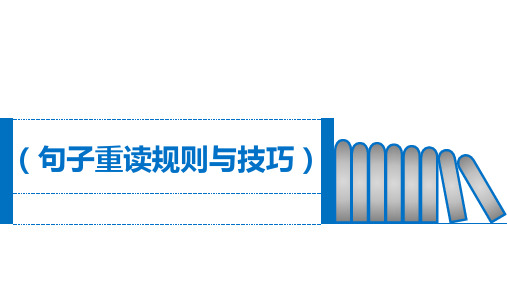
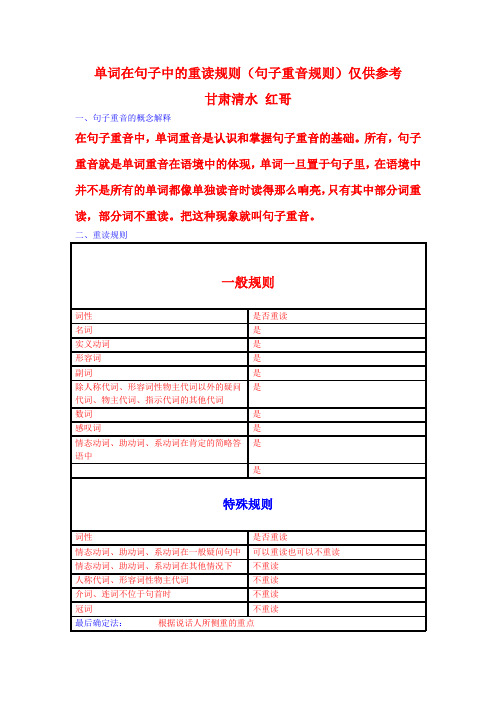
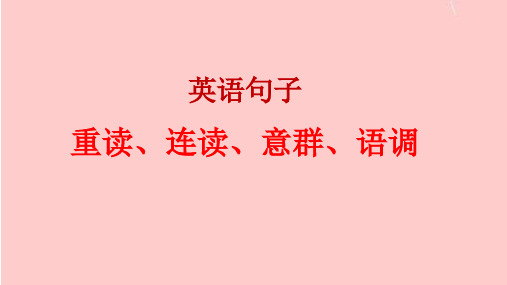
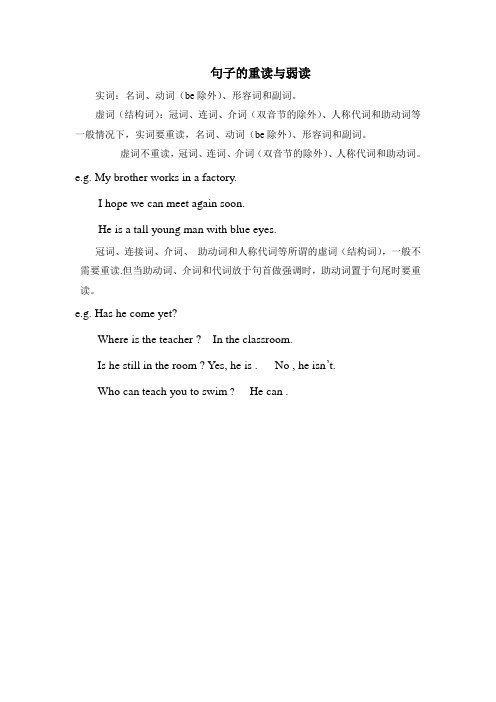
句子的重读与弱读
实词:名词、动词(be除外)、形容词和副词。
虚词(结构词):冠词、连词、介词(双音节的除外)、人称代词和助动词等一般情况下,实词要重读,名词、动词(be除外)、形容词和副词。
虚词不重读,冠词、连词、介词(双音节的除外)、人称代词和助动词。
e.g. My brother works in a factory.
I hope we can meet again soon.
He is a tall young man with blue eyes.
冠词、连接词、介词、助动词和人称代词等所谓的虚词(结构词),一般不需要重读.但当助动词、介词和代词放于句首做强调时,助动词置于句尾时要重读。
e.g. Has he come yet?
Where is the teacher ? In the classroom.
Is he still in the room ? Yes, he is . No , he isn’t.
Who can teach you to swim ? He can .。

英语句子得重读与弱读一、什么就是句子重音我们在朗读英语或用英语交谈时,并不就是句子中得每个词都读得一样响亮。
一样清楚,而就是有些词读得或说得又轻又快,而且较为含糊,有些词则读得或说得又重又慢,而且较为清晰。
那些读得或说得响亮而清晰得词就就是句子重音所在。
二、句子重音得功能1、体现句子得节奏感与韵律感。
2、突出重点,使听者更容易理解。
三、哪些词在句子中需重读1、一般来说,在句子中需重读得词都就是实词,比如,名词、动词、形容词、副词、数词、代词等。
不重读得多为虚词,比如,冠词、连词、介词、感叹词等。
例如:The streets are wide and clean、(这句话中得streets就是名词,wide 与clean就是形容词,它们都要重读;the, are, and不重读。
)I am so glad to see you again、(这句话中得so, glad, see, again要重读,而I, am, to, you不重读。
)2、有时候虚词也要重读,以下几点需注意:1)强调或突出某个虚词或be动词时,应将其重读。
例如:We saw him playing by the river、(这句话中得we与him一般不重读,但为了表示强调也可以重读。
比如,如果we重读,则强调就是"我们"而不就是别人瞧见。
)2)介词在句首时往往要重读。
例如:On my way to school, my bike was broken、(这句话中得on在句首应重读。
)3)be动词及助动词与not结合时要重读。
例如:I'm sorry I can't do that、(这句话中得can't要重读。
)Didn't I tell you yesterday? (这句话中得didn't要重读。
)4)句子末尾得be动词与助动词一般要重读。
例如:-Are you a student? -Yes, I am、(这里得am要重读。
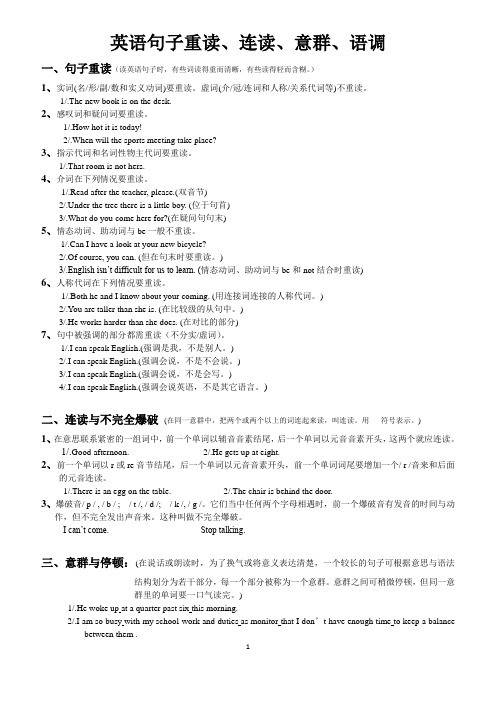
英语句子重读、连读、意群、语调一、句子重读(读英语句子时,有些词读得重而清晰,有些读得轻而含糊。
)1、实词(名/形/副/数和实义动词)要重读。
虚词(介/冠/连词和人称/关系代词等)不重读。
1/.The new book is on the desk.2、感叹词和疑问词要重读。
1/.How hot it is today!2/.When will the sports meeting take place?3、指示代词和名词性物主代词要重读。
1/.That room is not hers.4、介词在下列情况要重读。
1/.Read after the teacher, please.(双音节)2/.Under the tree there is a little boy. (位于句首)3/.What do you come here for?(在疑问句句末)5、情态动词、助动词与be一般不重读。
1/.Can I have a look at your new bicycle?2/.Of course, you can. (但在句末时要重读。
)3/.English isn’t difficult for us to learn. (情态动词、助动词与be和not结合时重读)6、人称代词在下列情况要重读。
1/.Both he and I know about your coming. (用连接词连接的人称代词。
)2/.You are taller than she is. (在比较级的从句中。
)3/.He works harder than she does. (在对比的部分)7、句中被强调的部分都需重读(不分实/虚词)。
1/.I can speak English.(强调是我,不是别人。
)2/.I can speak English.(强调会说,不是不会说。
)3/.I can speak English.(强调会说,不是会写。
英语句子重读作文模板英文回答:Using Sentence Stress to Emphasize Meaning in Writing。
Sentence stress is a crucial element in conveying the intended meaning of a sentence. By emphasizing certain words or phrases, writers can highlight important information, create emphasis, and convey emotions.Types of Sentence Stress。
Contrast: Emphasizing a word or phrase to contrast it with another part of the sentence.Emphasis: Stressing a word or phrase to draw attention to its importance.Surprise: Highlighting a word or phrase to create a sense of surprise or unexpectedness.Correction: Emphasizing a word or phrase to correct a previous statement or idea.Emotion: Using stress to convey emotions, such as anger, joy, or sadness.How to Use Sentence Stress in Writing。
1. Identify Important Words and Phrases: Determine the key words and phrases that convey the main message or emphasize the intended meaning.2. Use Stress Markers: Utilize italics, underlining, bolding, or capitalization to visually indicate stressed words or phrases.3. Vary Stress Placement: Change the position of stressed words or phrases within the sentence to create different effects and emphasize different aspects of the message.4. Consider Context: Take into account the overall context of the writing and the intended audience to ensure that the sentence stress aligns with the desired interpretation.Benefits of Using Sentence Stress。
英语句子的重读和弱读一、什么是句子重音我们在朗读英语或用英语交谈时,并不是句子中的每个词都读得一样响亮。
一样清楚,而是有些词读得或说得又轻又快,而且较为含糊,有些词则读得或说得又重又慢,而且较为清晰。
那些读得或说得响亮而清晰的词就是句子重音所在。
二、句子重音的功能1.体现句子的节奏感和韵律感。
2.突出重点,使听者更容易理解。
三、哪些词在句子中需重读1.一般来说,在句子中需重读的词都是实词,比如,名词、动词、形容词、副词、数词、代词等。
不重读的多为虚词,比如,冠词、连词、介词、感叹词等。
例如:The streets are wide and clean. (这句话中的streets是名词,wide和clean是形容词,它们都要重读;the, are, and不重读。
)I am so glad to see you again. (这句话中的so, glad, see, again要重读,而I, am, to, you不重读。
)2.有时候虚词也要重读,以下几点需注意:1)强调或突出某个虚词或be动词时,应将其重读。
例如:We saw him playing by the river.(这句话中的we和him一般不重读,但为了表示强调也可以重读。
比如,如果we重读,则强调是"我们"而不是别人看见。
)2)介词在句首时往往要重读。
例如:On my way to school, my bike was broken. (这句话中的on在句首应重读。
)3)be动词及助动词和not结合时要重读。
例如:I'm sorry I can't do that. (这句话中的can't要重读。
)Didn't I tell you yesterday (这句话中的didn't要重读。
)4)句子末尾的be动词和助动词一般要重读。
例如:-Are you a student -Yes, I am. (这里的am要重读。